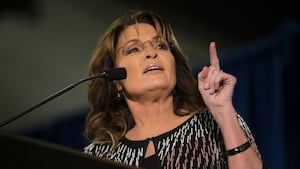I'm fed up with white liberals virtue-splaining to people of color what we should be saying, thinking, and feeling.
As a longtime Latino columnist, I give my opinions for a living, and it’s part of the job description that you won’t ever be able to please everyone. This has led to many things being virtue-splained to me over three decades, often by condescending white liberals who would talk down to me because they believed they were better humans who cared more about my people than I did.
One exchange comes to mind, and it happened before I was even in the professional opinion business. As a student at Harvard, I publicly confronted United Farm Workers president Cesar Chavez. I’m from the same region of Central California where much of the UFW’s fabled history was written. My informed view then, and now, is that the UFW—beginning in the 1980s—strayed from its original mission of organizing farm workers to concentrate on marketing the grape boycott to white liberals in the Northeast.
Chavez got angry over being challenged, and we wound up in a tense exchange. In attendance was Kerry Kennedy, the daughter of my hero—Robert F. Kennedy—who later came over to me, stuck her finger in my face, and scolded me for the infraction. “Whose side are you on?” she disdainfully asked.
I imagine that, right about now, The Rock can relate. Even as one of the most successful action movie stars in the world, Dwayne Johnson—who is half-Black, half-Samoan—is not immune to virtue-splaining by would-be white saviors.
As Johnson learned recently, he is not free to think for himself or express opinions that aren’t pre-approved by moral arbiters who represent the most virtuous among us.
The person who took it upon himself to chip away at The Rock was bestselling author and liberal activist Don Winslow. During the dark days of the Trump years, Winslow began to dabble in social commentary by tweeting about politics and producing short videos on current events, substantially increasing his following along the way.
Last week, Winslow stepped up to put Johnson on notice that he is not at liberty to publicly express his support, admiration or fondness for controversial podcaster Joe Rogan. Here’s the backstory that explains how we got here.
The comedian and commentator who hosts the wildly popular podcast The Joe Rogan Experience has come under fire over the last several months for making inaccurate claims about COVID-19 and vaccinations. Rogan—whose podcast episodes are downloaded as many as 11 million times—is accused of giving substantial airtime to sketchy vaccine critics with questionable credentials who cite dubious “research.”
This has enraged Rogan’s critics, who claim that he is “spreading misinformation” to the masses and blame him for contributing to the deaths of what are now more than 900,000 Americans from the coronavirus.
Broadcasting falsehoods and half-truths has not hurt Rogan’s bottom line. In 2020, he signed a multi-year $100 million deal with Spotify that remains intact.
To protest Spotify’s affiliation with Rogan, Neil Young and Joni Mitchell pulled their music from the Sweden-based audio streaming and media services provider.
In response, Rogan posted a nearly 10-minute video on his Instagram account on Jan. 31, in which he tried to explain himself and promised to do a better job in the future of airing a more diverse set of opinions.
“If I pissed you off, I’m sorry,” Rogan told his 14 million followers in the video. “I’m not trying to promote misinformation. I’m not trying to be controversial. I’ve never tried to do anything with this podcast other than just talk to people and have interesting conversations.”
Yet the podcaster also pushed back on the charge that he spreads misinformation about COVID-19 and vaccines.
“The problem I have with the term misinformation, especially today, is that many of the things that we thought of as misinformation just a short while ago are now accepted as fact,” he said.
Clearly impressed by the sentiments expressed, Johnson posted a supportive comment on Rogan’s Instagram account that read: "Great stuff here brother. Perfectly articulated. Look forward to coming on (the show) one day and breaking out the tequila with you."
That seemingly harmless remark ran afoul of the virtue police, and this is where the story took an uncomfortable turn—one involving what’s perhaps the ugliest and triggering word in the English language.
After singer-songwriter India Arie posted to social media on Feb. 3 a video montage of Rogan saying the N-word more than 20 times on his podcast over the last 12 years, and even at one point joking about the movie Planet of the Apes and Black neighborhoods, Winslow saw an opportunity to tweak Johnson with a tweet.
“You’re a hero to many people and using your platform to defend Joe Rogan, a guy that used and laughed about using the N word dozens of times, is a terrible use of your power,” Winslow wrote on Twitter. “Have you actually listened to this man’s many racist statements about Black people?”
It takes a special and concentrated form of chutzpah for a white man to even dare suggest that he cares more about “Black people” than does an actual Black person.
Still, Johnson was gracious in response, tweeting back to Winslow: “I hear you as well as everyone here 100%. I was not aware of (Rogan’s) N word use prior to my comments, but now I’ve become educated to his complete narrative. Learning moment for me.”
Rogan has apologized for using the N-word. As well he should.
This is a learning moment for everyone. Winslow seems to view Johnson as having some magical social media “power” that he wants to co-opt. But the writer has 770,000 Twitter followers, a large platform, which he can use however he pleases.
Trouble is, in the cancel culture, what goes around usually comes around. Think of the celebrity journalist who pounces on a male politician who is experiencing a #MeToo moment, only to later face accusations of his own. These days, that’s a long list.
Winslow should now try to live up to the standard he set and use his considerable soapbox to apologize for his own hypocrisy. Turns out, many of the writer’s grittier books freely toss around the “N-word.”
As a Mexican-American, one passage in particular from his book Savages, which refers to “humble, respectful (N-word) taco Mexicans.”
Mr. Winslow, consider this a learning moment. You might be a fiction writer, and your characters’ words are not your own, but your coarse prose could be interpreted as a “terrible use of your power.” That’s what happens when you decide to police other people’s words—yours will inevitably be ungenerously scrutinized as well. That’s fair.
It’s not enough to say you want people of color to be free. You can’t legitimately go around calling yourself a liberal until you let them be free of you.
Winslow—and would-be discourse cops like him—ought to back off. Let The Rock be The Rock, white liberals, and let the rest of us just be.








